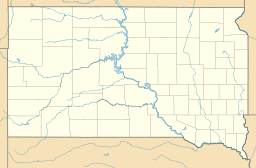Lake Poinsett (South Dakota) facts for kids
Quick facts for kids Lake Poinsett |
|
|---|---|
| Location | Hamlin / Brookings counties, near Arlington, South Dakota |
| Coordinates | 44°34′6″N 97°5′7″W / 44.56833°N 97.08528°W |
| Basin countries | United States |
Lake Poinsett is one of the largest lakes you can find in the state of South Dakota. It's a great spot for outdoor fun and has an interesting history!
Contents
Lake Poinsett: A Big Lake in South Dakota
Lake Poinsett is a really important natural feature in South Dakota. It's known for its size and the beautiful areas around it. People visit the lake for many reasons, like fishing, boating, and enjoying nature.
Where is Lake Poinsett Located?
This large lake is found in the eastern part of South Dakota. It sits northeast of a town called Arlington, South Dakota. The lake actually stretches across two different counties: Hamlin County and Brookings County.
How Did Lake Poinsett Get Its Name?
Lake Poinsett was named after a very important person named Joel Poinsett. He was the U.S. Secretary of War. This job meant he was in charge of the country's military and defense at the time. He helped support important explorations that mapped out new parts of the United States.
Exploring the Lake's History
The area around Lake Poinsett has a long history. In 1838, a special journey, called an expedition, explored this region for the first time. This expedition was led by Joseph Nicollet and John Fremont. They were explorers who traveled across the land to map it and learn about its geography. They even set up camp on the north shore of Lake Poinsett during their trip. Joel Poinsett, who the lake is named after, was very helpful in making sure this expedition could happen. He believed it was important to explore and understand the land.
Living by Lake Poinsett
Many people enjoy living close to Lake Poinsett. There are homes and neighborhoods built right along the lake's shores. These areas are grouped together and are known as a census-designated place called Lake Poinsett. A census-designated place is a special area that the government uses for counting people and gathering information, even though it's not officially a city or town.
 | John T. Biggers |
 | Thomas Blackshear |
 | Mark Bradford |
 | Beverly Buchanan |



